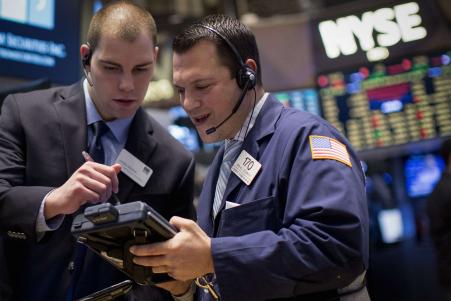By Jessica Menton -

U.S. stocks rallied Friday, snapping five straight sessions of losses, after oil prices rebounded and consumer sentiment leaped to an 11-year high. Oil prices spiked above $50 per barrel Friday after trading near a six-year low earlier this week amid global growth concerns after the Swiss National Bank shocked financial markets Thursday by abandoning a three-year-old cap on the franc.
On Friday, the Dow Jones Industrial Average jumped 109.86 points, or 1.10 percent, to close at 17,511.57; the S&P 500 stock index rose 26.75 points, or 1.34 percent, to end at 2,019.42. The Nasdaq Composite gained 63.56 points, or 1.39 percent, to finish at 4,634.38.
Consumer Sentiment Hits 11-Year High
Consumer sentiment soared to an 11-year high this month as declining gas prices boosted consumer optimism. Americans are benefiting from the drop in oil prices as the average cost of gasoline in the U.S. has fallen to $2.09 per gallon, down $1.22 from a year ago, according to Gasbuddy.com.
Consumer sentiment jumped to 98.2, the highest level since 2004, from a final December reading of 93.6, according to the preliminary January reading of the University of Michigan/Thomson Reuters consumer-sentiment index.
Gasoline prices continued falling due to the global drop in crude oil prices. Crude prices rebounded Friday, spiking above $50 per barrel, after stronger-than-expected consumer sentiment boosted investor sentiment. West Texas Intermediate crude, the benchmark for U.S. oil prices, gained 4.78 percent Friday to $48.46 per barrel, for Feb. 15 delivery, on the New York Mercantile Exchange. Brent crude, the global benchmark for oil prices, rose 3.46 percent Friday, to $49.94 per barrel, for Feb. 15 delivery, on the London ICE Futures Exchange.
"Despite the threat that lower oil prices may dent some sectors of the U.S. economy, we expect growth in 2015 to remain above 3 percent as consumers reap the benefits of cheap energy prices," Peter Cardillo, chief market economist at Rockwell Global Capital, said in a note to investors.
Sharpest Drop in Consumer Prices in Six Years
U.S. consumer prices posted their biggest drop in six years last month as inflation continues to slow after oil prices have declined more than 40 percent since June. That has given some Federal Reserve officials pause as they debate whether to hike interest rates this year. Most economists don't expect the central banks to raise rates before the middle of 2015.
The Consumer Price Index declined 0.4 percent in December after falling 0.3 percent in November," the U.S. Bureau of Labor Statistics said Friday. In the 12 months through December, CPI increased 0.8 percent. Core CPI, excluding volatile components such as food and energy, was unchanged in December, following a 0.2 percent increase in October and a 0.1 percent rise in November.
Following the report, a top Federal Reserve official said the Federal Open Market Committee, the branch of the Federal Reserve Board that determines the direction of monetary policy, was surprised that inflation remains low.
"The surprise has been that real GDP growth has been about as expected, but labor markets have improved more rapidly than expected, while inflation has remained low," James Bullard, president of the Federal Reserve Bank of St. Louis, said during a CFA Society of Chicago event Friday.
The surprise pulls the FOMC in two directions on monetary policy, Bullard said. While a better-than-expected performance of the real economy suggests a more aggressive rate policy, Bullard said lower-than-expected inflation outcomes weigh on the credibility of the FOMC's inflation target of 2 percent and suggest a less aggressive rate policy.
Goldman Sachs Q4 Profit Drops 7% After Bond Trading Business Plunges 29%
Shares of Goldman Sachs Group Inc. NYSE:GS initially dropped more than 1 percent Friday, after the investment bank's profit dropped 7.1 percent last quarter compared with a year ago. However, the New York-based company pared losses to close down 0.71 percent to $177.23.
The investment bank's fixed income division, which trades bonds, currencies and commodities, saw its profit plunge 29 percent last quarter. The drop in the segment's profit was a surprise considering it is traditionally one of the company's strongest divisions.
The company closed out a week of lackluster results from the U.S. banking sector, after Bank of America Corporation's Thursday reported an 11 percent drop in quarterly profit, also largely due to lower revenue from fixed-income trading. Meanwhile, Citigroup Inc.'s fourth-quarter earnings plunged 86 percent due to a $3.5 billion charge from legal cost. JPMorgan Chase & Co. disappointed investors Wednesday and reported a 6.6 percent drop in quarterly profit as legal costs exceeded $1 billion in the wake of government probes.
Morgan Stanley, the sixth-biggest U.S. bank by assets, is slated to post quarterly results Tuesday, the last of the major U.S. banks to report following a lackluster earnings season for the financial sector.
